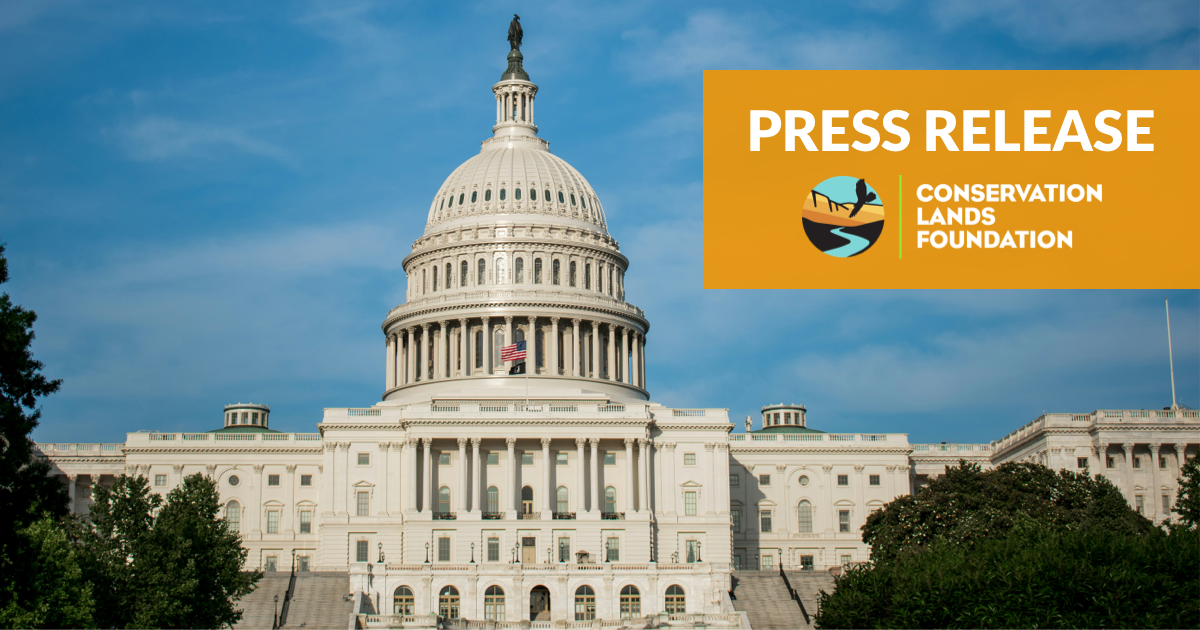Republicans Strip Sell-Off Provisions but Public Lands still on the Chopping Block
Despite last-minute walk-back, Americans still see worst environmental bill in a generation as a blueprint for public land sell-off.

Washington, D.C. — After weeks of public outrage and mounting bipartisan backlash, House Republicans quietly removed a provision that would have mandated the sale of thousands of acres of public lands. But while the immediate threat of sell-off may be gone, advocates across the country say the damage remains.
The budget bill—deemed by many as the most dangerous environmental legislation in modern U.S. history—still includes sweeping measures that gut environmental safeguards, fast-track development, and strips the public of any voice in how their lands are managed.
The provision to sell off land was originally slipped into the bill by Reps. Mark Amodei (NV) and Celeste Maloy (UT) just before midnight on May 6 during a Natural Resources Committee hearing. Members had less than 30 minutes to review it. The amendment passed 23–18 along party lines, with Rep. Jeff Hurd (CO) as the only Republican opposing it.
Citizens across the country called the removal a “temporary concession” that does not change the bill’s core threat to public lands, wildlife, and climate action. The bill is now set for a vote by the full House later this week.
Here is what people across the country are saying:
“Selling our shared public lands to pay for tax cuts for the rich was and is an awful, un-American idea, and we appreciate Rep. Zinke's work to keep it out of the bill. His colleagues never should have considered it in the first place. Unfortunately, even without selling off public lands outright, this budget reconciliation proposal remains the most extreme legislative attack on public lands in our nation’s history. We call on Congress to reject this mass giveaway to powerful corporate interests.”
- Lydia Weiss, senior director for government relations, The Wilderness Society
"We are heartened to see the removal of language from the House budget reconciliation package that would have sold off public lands in Nevada and Utah, opened up drilling in the National Petroleum Reserve-Alaska, and blocked the implementation of science-based land management plans. We are grateful for the leadership of Representatives Dina Titus of Nevada and Ryan Zinke of Montana in ensuring the public lands sell-off provisions were removed from this package, along with many other bipartisan representatives who spoke out on this issue. Despite the removal of these provisions, the budget reconciliation package remains a wholesale assault on America's public lands and waters by rescinding crucial conservation, restoration and resilience funding for the Bureau of Land Management. Considering these facts, we call on the House to reject this destructive bill.”
- David Feinman, Vice President of Government Affairs, the Conservation Lands Foundation
“Public lands are not a luxury or bargaining chip in budget negotiations. They are owned by every American and cherished by residents and visitors alike,” said Greater Yellowstone Coalition Executive Director Scott Christensen. “More than 70 percent of the lands in the Greater Yellowstone region are public and include the national forests, parks, and rangelands where millions of people recreate and make a living. Proposals that seek to sell-off public lands represent a dangerous, slippery slope that would harm local economies and our country’s most important natural assets. We must continue to protect our treasured public lands now and for future generations.”
“The American people have spoken loud and clear – our public lands should not be for sale. Members of Congress from both sides of the aisle were right to throw this proposal in the trash can, but a bad bill is still a bad bill. As written, Donald Trump’s reconciliation package is a giveaway to corporate polluters that would make it easier for billionaires to drill, mine, and log the public lands that belong to all Americans, from the Arctic Refuge to the desert landscapes of the southwest. We will continue to work to keep the ‘public’ in public lands and make sure that big corporations pay their fair share.” - Athan Manuel, director of Sierra Club’s Lands Protection Program
“This bill remains the most dangerous attack on public lands in a generation,” said Katie Umekubo, Managing Director, Lands, NRDC. “It guts environmental safeguards, shuts out the public, and turns over millions of acres to drillers, miners, and loggers. Congress should reject this reckless blueprint for industrializing our most cherished places.”
“There is still much wrong with the reconciliation bill, but thanks to overwhelming outcry from people across the country, public lands have been saved from privatization—for now. But we must remain vigilant. The profiteers and their allies in Congress are certain to regroup and come back with a different scheme to grab public lands. They always do.” - Chris Krupp, Public Lands Attorney, WildEarth Guardians
“Americans across the political spectrum have spoken loudly in support of keeping public lands in the hands of the American people, and we are grateful that Congress has listened and removed the public lands sell-off amendment from the budget reconciliation package. Unfortunately there is little else to celebrate, as this budget reconciliation package still amounts to an early Christmas gift for mining companies, the oil and gas industry, and other polluting industries. This battle is far from over, and we will continue to be vigilant and fight for our wild public lands and waters now and for future generations.” - LD Delano, Board Chair, Great Old Broads for Wilderness
“Today we breathe a sigh of relief that Congress came to its senses and stripped the Amodei/Maloy amendment to sell off our public lands on the Colorado Plateau,” said Tim Peterson, Cultural Landscapes Director for the Grand Canyon Trust. “In Utah, lands bordering Zion National Park should never have been on the table for sale, especially without the opportunity for the public to weigh in on whether it was a good idea. We hope Congress will get the message that Americans want to keep their public lands, not sell them off to corporate interests.”
"The removal of the public land sale provision is a very welcome step, but the House GOP’s budget bill still seeks to remove the “public” from “public lands” by eliminating nearly all meaningful environmental review and public involvement from a litany of proposed actions on our public lands, including providing a pay for permit scheme for polluters,” said Brien Webster, Public Lands Campaign Manager, Conservation Colorado. “Coloradans love our public lands, not just because they are integral to our way of life, but also because they support vital industries such as ranching and an outdoor recreation industry that generated over $65.8 billion in economic output statewide and supported 404,000 jobs in 2023. We trust that as this bill moves towards a floor vote, our House delegation members will represent our values.”
“Coloradans of all political stripes have made it clear: they do not support the sell-off of our public lands,” said Keeley Meehan, Policy Director for the Colorado Wildlands Project. “The removal of sell off language in the budget reconciliation package is a hard-won victory – but the bill as a whole remains a sweeping attack on public lands and rural communities. The bill contains numerous provisions that sideline local voices and dismantle the collaborative processes that protect the wild places we all cherish.”
“Public lands are a core part of our identity and belong to all Americans,” said John Robison, Public Lands Director with the Idaho Conservation League. “While we are deeply concerned with other provisions in this bill, these fast-tracked public lands sales would have set a terrible precedent and done permanent damage to the fabric of communities throughout the West. The people prevailed.”
“This amendment would have given handouts to private interests at the expense of regular people,” said Emily Cleveland, Senior Program Director at Wild Montana. “Selling off public lands, now or ever, threatens our freedom to hunt, hike, fish, camp, and ride. These places belong to the American people, and we’re glad Rep. Zinke and the rest of Montana’s delegation led the way in stopping our public lands from being fenced off and handed over to corporate interests.”
Since Nevada was ground zero for the public lands sell-off, we are deeply grateful for the efforts of all those who worked to remove that provision from the budget reconciliation bill. While the remaining bill is still deeply flawed, Nevadans appreciate people across the country standing up for the importance of our public lands” said Shaaron Netherton, Executive Director at Friends of Nevada WIlderness.
It is not a coincidence that the Republican majority has been sneaking around like a thief in the dark. They attempted to use this deeply cynical maneuver with no debate and no transparency literally in the middle of the night because they know Americans of every political stripe are vehemently opposed to selling off our public lands,” said Mark Allison, Executive Director of New Mexico Wild. “Squandering our children’s inheritance by liquidating cherished places like Caja del Rio, Otero Mesa, the San Juan Badlands, and the areas around Chaco for the sake of tax cuts for billionaires? Hurting our ability to prepare for and combat wildfires? Sacrificing our traditional uses and cultural resources? Putting a “No Trespassing” sign at our favorite place to camp with our families? New Mexico votes NO!”
“Oregon’s high desert is a wonderful legacy of public lands and resources bestowed on all Americans to use and enjoy, but with the expectation that we pass them on to future generations,” said Mark Salvo, Conservation Director for Oregon Natural Desert Association. “The mere notion of selling them off for private gain would not only deprive us of this priceless gift, but would be a dereliction of duty to our children and grandchildren.”
"As we hoped would be the case, Rep. Maloy's stunt failed. She's just the latest in a long list of politicians with the bad idea to try and sell off public lands," said Travis Hammill, DC Director for the Southern Utah Wilderness Alliance (SUWA). "The through line of those failed efforts is this: love of public lands transcends geography and political party. Americans don't want to see these lands sold off and time and time again have risen up to make their voices heard.”
“We applaud the removal of the provision selling off hundreds of thousands of acres of public land and are glad that Congress is recognizing that land sell-off is untenable. But the underlying budget reconciliation bill would still be devastating for American wildlife and the habitats they depend on,” said Robert Dewey, vice president of government relations at Defenders of Wildlife. “It puts a bullseye on already imperiled polar bears, whales and hundreds of other species that depend on the integrity of federal lands and waters for their survival. Congress shouldn't be allowing these vital and cherished wildlife habitats on public lands to be ruined by extractive industries for bigger profits.”
“We appreciate the bipartisan support for ultimately removing the public lands sell off provision in the budget bill,” said Tom Uniack, Executive Director at Washington Wild. “There was little doubt that if this provision remained that we would see additional efforts to sell off national parks, forest and other federal public lands in states beyond Utah and Nevada.”
“Thankfully, the most overt attempt to privatize our public lands has failed - for now. But the Republican Reconciliation bill still contains provision after provision that will turn over public lands to extractive industries, exclude the public from decision making processes, and ultimately lead to environmental destruction and species extinctions,” said Josh Osher, Public Policy Director for Western Watersheds Project. “Americans have been loud and clear that we value healthy public lands, wildlife habitat, clean water, and clean air over privatization, development, and pollution. At least on this one point, it seems our voices have been heard.”




